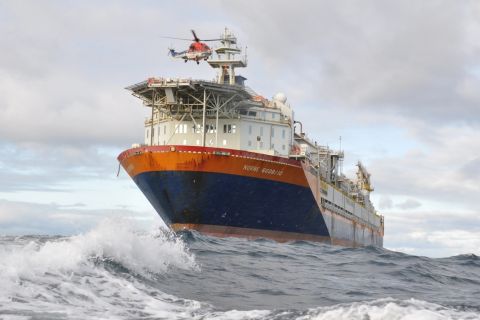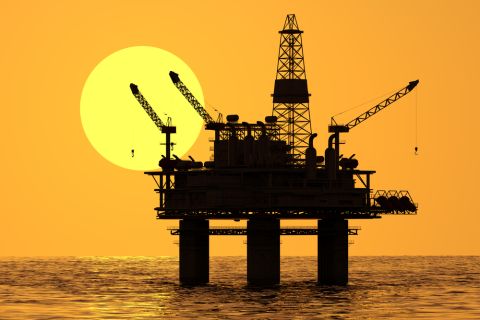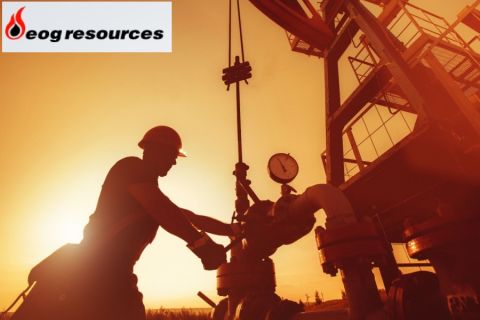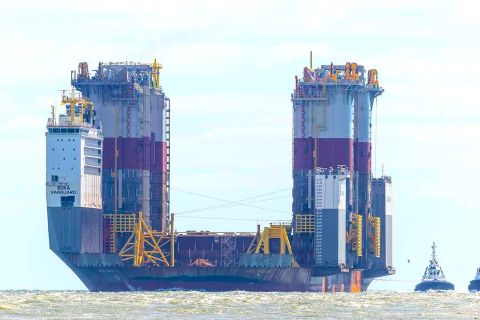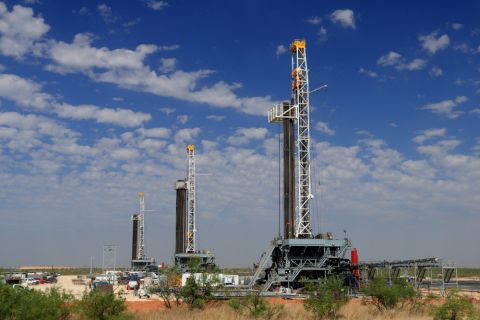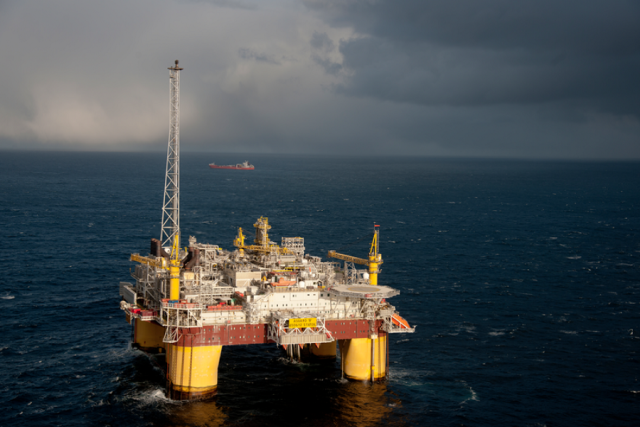
Gas from Equinor’s Berling Field will be processed on Åsgard B. (Source: Equinor/Øyvind Hagen)
Second of two parts. Find part 1 here.
Subsea tiebacks not only lower the carbon intensity of new developments, but they also leverage production capacity at existing facilities.
Preparing tiebacks is a multiyear process, and many are already planned to come online in 2025 and beyond. The North Sea, with its rich history of oil and gas developments, is home to many of those scheduled tiebacks.
The following project-by-project summary updates the status of these projects. Information was gathered from public information and analysis. The second in a two-part series, here are some of the subsea tiebacks scheduled to come online beginning in 2025.
| Project name | Country | Block/License | Water depth feet | Status | Onstream | Operator |
|---|---|---|---|---|---|---|
| Ballymore | U.S. | Mississippi Canyon Block 607 | 6,550 | Sanctioned | 2025 | Chevron |
| Berling | Norway | PL644, PL 644 B, PL 644 C | 918 | Sanctioned | 2028 | OMV Norge |
| Crux | Australia | AC/RL9 | 540 | Sanctioned | 2027 | Shell |
| Cypre | Trinidad & Tobago | East Mayaro Block | 260 | Sanctioned | 2025 | BP |
| Dvalin North | Norway | PL 211 | 1,378 | Sanctioned | 2026 | Wintershall Dea |
| Haltenbanken East | Norway | PL263, PL312, PL473, PL074, PL471 | 980 | Sanctioned | 2025 | Equinor |
| Irpa | Norway | 6705/10-1 | 4,400 | Sanctioned | 2026 | Equinor |
| Jackdaw | U.K. |
P098, P672, P111 |
256 | Sanctioned | 2025 | Shell |
| Lapa South-West | Brazil | BM-S-9 | 7,000 | Sanctioned | 2025 | TotalEnergies |
| Trell & Trine | Norway | PL102F/G, PL036E/F | 400 | Planning | 2025 | Aker BP |
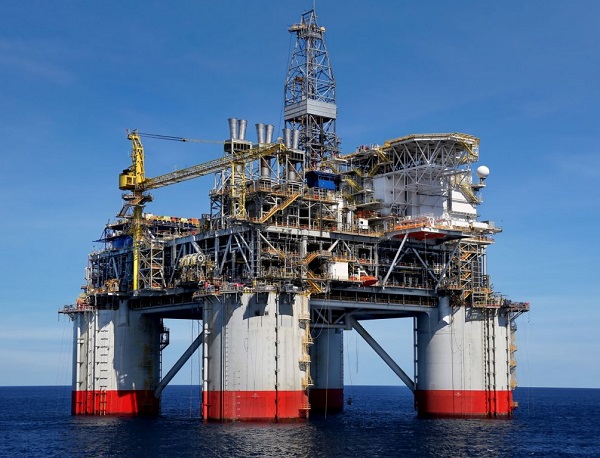
Ballymore
Chevron’s Ballymore Field, discovered in 2018, is a deepwater subsea tieback project in Mississippi Canyon Block 607 in the U.S. Gulf of Mexico (GoM) that the operator sanctioned in May 2022.
The development will tie back to Chevron’s Blind Faith facility 3 miles away. Ballymore is expected to produce 75,000 bbl/d and recover 150 MMboe, with first oil expected in 2025.
In 2021, Chevron awarded Worley an engineering and design services contract for the integration and subsea tieback of the field in 6,550 ft water depth. Worley also provided procurement services for the topsides.
Subsea7 won the contract to install a steel catenary riser, flowline and control system. Subsea7 had supported Chevron with early engineering prior to the award.
To assist in handling the additional gas that’s coming to the Blind Faith facility via the Ballymore tieback, Williams signed a contract to use its existing connections to Blind Faith to provide offshore natural gas gathering and crude oil transportation services as well as onshore natural gas processing services for the production.
Chevron operates the field with 60% interest, while partner TotalEnergies holds 40% interest.
Berling
OMV Norge has submitted the Berling Field plan for development and operation to Norway’s Ministry of Petroleum and Energy.
In December 2022, OMV and its partners decided to invest $921 million to develop the Berling Field, formerly called Iris Hades, in the Norwegian Sea 12 miles from the Åsgard Field. The field sits in 918 ft water depth and stretches across the PL644, PL644B and PL644C licenses, which have aligned ownership interests.
The development concept calls for a four-slot subsea template with three producing wells tied back to the Equinor-operated Åsgard B platform. The rich gas will be processed on Åsgard B and transported via the Åsgard Transport System for further processing at Kårstø gas processing plant. The condensate will be transferred to Åsgard and co-mingled with other Åsgard production for storage and export by shuttle tankers to the market.
The estimated recoverable resources are 45 MMboe, and production is expected to start in 2028.
OMV Norge has signed a contract with TechnipFMC for the front-end engineering and design for the subsea production system. OMV Norge also awarded a four-year frame agreement to Baker Hughes for integrated well construction and completion services for the three production wells.
OMV also partnered with Wintershall Dea to jointly award a drilling contract to Transocean in September 2022. OMV will have exclusive use of the Transocean Norge semi-submersible.
OMV (Norge) AS operates the field with 30% working interest on behalf of partners Equinor, with a 40% stake, and DNO Norge with 30%.
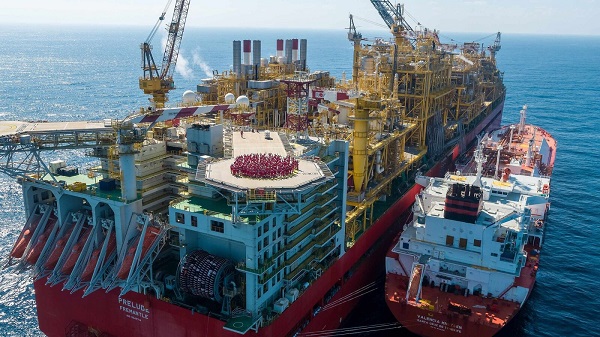
Crux
Last May, Shell Plc gave the go-ahead to develop the Crux Field off Australia. Analysts have speculated that development will cost around $2.5 billion.
The Shell-operated natural gas development is in the northern Browse Basin, 120 miles offshore northwest Australia in AC/RL9.
Wood and KBR have completed the integrated FEED contract they won in 2019.
The Crux Field was discovered by the Crux-1 well in 2000, and four appraisal wells drilled between 2006 and 2008 confirmed significant petroleum resources. Construction is expected to start this year with first gas expected in 2027.
The project consists of a platform, not normally manned, that will be operated remotely from Shell’s Prelude floating LNG (FLNG) facility. The facility will serve five production wells in 540 ft water depth. Production capacity is 550 MMcf/d of gas. Crux has an estimated minimum lifespan of 20 years.
Crux will connect to the Prelude FLNG, Shell’s 3.6 million tonnes per annum (mtpa) facility, via a 100-mile export pipeline.
Shell Australia operates the project with 82% stake on behalf of partners SGH Energy with 15% and Osaka Gas with 3%.
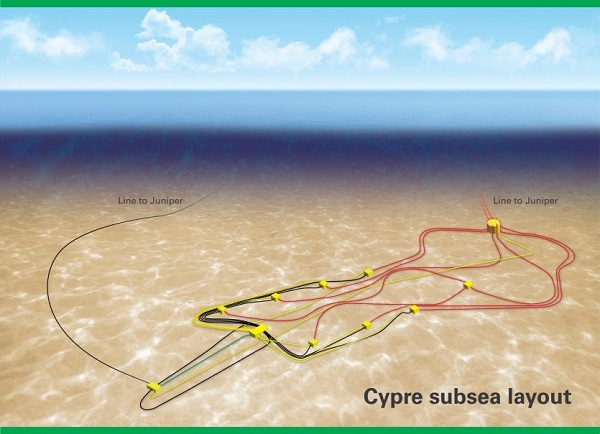
Cypre
BP Trinidad and Tobago’s (bpTT) Cypre is expected to come onstream in 2025 as a subsea tieback to its operated Juniper platform.
Drilling at bpTT’s third subsea development is expected to begin this year. The operator sanctioned the project in September 2022. The Cypre gas field is 48 miles off the southeast coast of Trinidad within the East Mayaro Block, in 260 ft of water.
OneSubsea and Subsea Integration Alliance were awarded a contract for the project. Subsea Integration Alliance’s scope covers concept and design, engineering, procurement, construction and installation (EPCI) of a two-phase liquid natural gas tieback to the Juniper platform, along with topside upgrades. OneSubsea will deliver subsea production systems.
The development will include seven wells and subsea trees tied back to bpTT’s existing Juniper platform via two new 9-mile flexible flowlines. At peak production, the development is expected to produce an average of 250 MMcf/d to 300 MMcf/d.
Cypre development, which is solely owned and operated by bpTT, will access power from Juniper, eliminating the need for additional power generation.
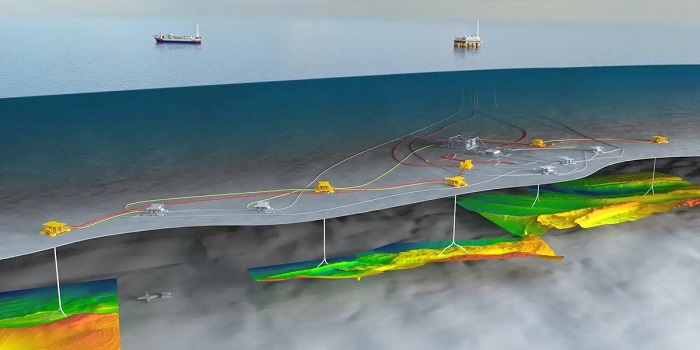
Dvalin North
In December 2022, Wintershall Dea and partners Petoro and Sval Energi submitted the Dvalin North Field plan for development and operation to the Norwegian Ministry of Petroleum and Energy.
The Dvalin North gas field is located 120 miles off the coast of northern Norway in a water depth of 1,380 ft. The field, which was the largest discovery in Norway in 2021, holds an estimated 84 MMboe. The field will be tied back to the Heidrun platform via the existing Dvalin Field on the Norwegian Continental Shelf (NCS).
The Dvalin North partnership will commit around $830 million to develop the discovery. Three producing wells will be drilled from a single subsea template six miles north of Wintershall Dea’s Dvalin Field, which is expected to begin production in the coming months. Dvalin North is scheduled for start-up late 2026.
Aker Solutions won the contract to deliver the subsea production system, which includes three horizontal subsea trees and control systems, a four-slot steel subsea template with an integrated manifold system, three wellhead systems and all associated tie-in and installation work. The scope also covers 6 miles of static subsea umbilicals. Final deliveries are planned for late 2025.
Wintershall Dea also awarded an EPCI contract to TechnipFMC for the design, engineering, manufacture and installation of pipe.
Wintershall Dea operates the field with 55% interest on behalf of partners Petoro with 35% and Sval Energi with 10%.
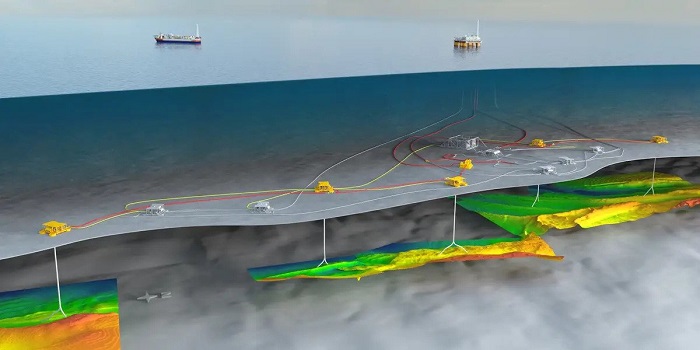
Haltenbanken East
In May 2022, Equinor and its partners submitted a plan to develop a cluster of gas and condensate discoveries in the Norwegian Sea that were once considered stranded assets in nearly 1,000 ft of water.
Haltenbanken East will be developed as a unit between four different licenses and comprises six discoveries and three additional prospects tied back to the Equinor-operated Åsgard B platform. The discoveries hold 100 MMboe, mostly gas.
The discoveries are Gamma, Harepus/Mikkel South, Flyndretind, Nona, Sigrid and Natalia, and the prospects are Flyndretind Ile, Tussen and Rita. They are located in PL263, PL312, PL473, PL074 and PL471.
In 2021, Equinor and its partners selected a development concept to bring the assets online in two phases. The first phase, which will take place in 2024 and 2025, includes drilling six wells at five of the discoveries. Production from the first two wells is expected in 2025 with the others going onstream as they are completed.
Phase two targets the last discovery and three prospects, which are planned to be drilled as side-tracks from existing wells.
TechnipFMC is manufacturing and installing pipelines and subsea structures.
Aker Solutions is supplying the subsea production system for the field, including seven standardized vertical subsea trees, five dual-slot satellite structures with manifolds and a metering station, as well as control systems, wellheads and tie-in equipment. Aker Solutions has also inked a letter of intent for an umbilical.
Equinor operates the project with 57.7% on behalf of Var Energi with 24.6% stake, Spirit with 11.8% and Petoro with 5.9%.
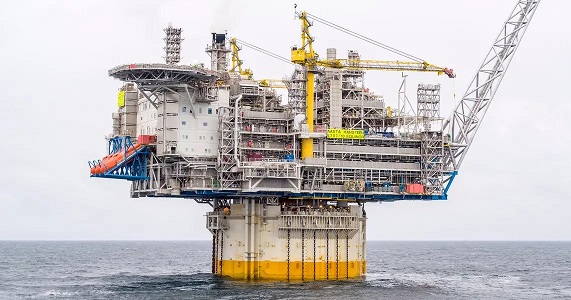
Irpa
Discovered in 2009, Irpa will be tied back to Aasta Hansteen, which is currently the deepest field development on the NCS.
Formerly known as Asterix, Irpa is located in 4,400 ft of water in the Norwegian Sea and holds estimated recoverable gas reserves of almost 700 Bcf, as well as 14 MMcf in condensates — or approximately 124 MMboe in all. The $1.4 billion development, which will include three wells, is expected online in the fourth quarter of 2026 and will ensure activity and stable gas deliveries from Aasta Hansteen until 2039. Equinor submitted the plan for development and operation to Norway’s Ministry of Petroleum and Energy in November 2022.
Saipem has the contract to install the pipeline. Saipem will install the 50-mile swaged pipe-in-pipe pipeline connecting the subsea production template of Irpa Field to the existing Aasta Hansteen platform. Saipem's Castorone will carry out offshore operations in 2025.
A Subsea7 and DeepOcean consortium will handle the engineering, transportation and installation of a mono-ethylene glycol (MEG) pipeline, a production riser, umbilical, subsea structures and tie-ins. Operations are planned to take place over the next three years.
TechnipFMC will provide subsea production systems under a framework agreement. The contract covers the supply and installation of subsea trees, control systems, structures, connections and tooling.
Equinor operates the field with a 51% interest on behalf of partners Petoro with 20%, Wintershall DEA with 19% and Shell with 10%.
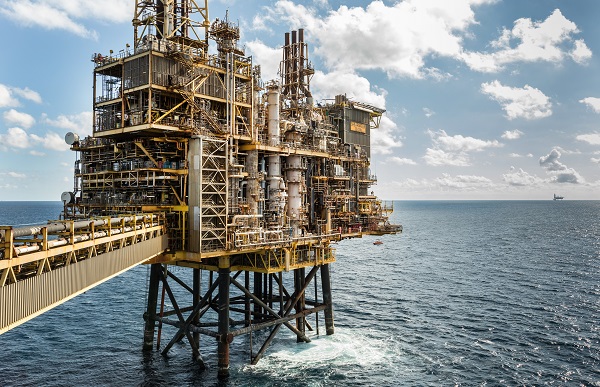
Jackdaw
The Jackdaw Field, originally discovered in 2005, is an ultra-high pressure/ high-temperature development that will tie production back to the nearby Shearwater gas hub in the U.K.’s North Sea.
Located in blocks 30/02a, 30/02d and 30/03a, Jackdaw is in 256 ft water depth. The project is expected to start production in 2025 with peak production estimated at 40,000 boe/d.
After receiving regulatory approval in early 2022, BG International Ltd., an affiliate of Shell U.K. Ltd., took final investment decision to develop the Jackdaw gas field. The plan calls for a wellhead platform (WHP) that is not permanently attended, along with four production wells and a 19-mile pipeline from the Jackdaw WHP to the Shearwater gas hub.
In 2019, Kvaerner entered into a FEED contract with Shell to perform an early phase design engineering of the WHP. Following its completion in 2022, Aker Solutions was awarded an EPCI contract for the WHP, as well as related load-out and offshore hook-up and commissioning.
TechnipFMC will handle pipelay for the tieback to the Shearwater platform, as well as an associated riser, spool pieces, subsea structures and umbilicals.
BG International Ltd. is the 100% owner and operator of the Jackdaw Field.
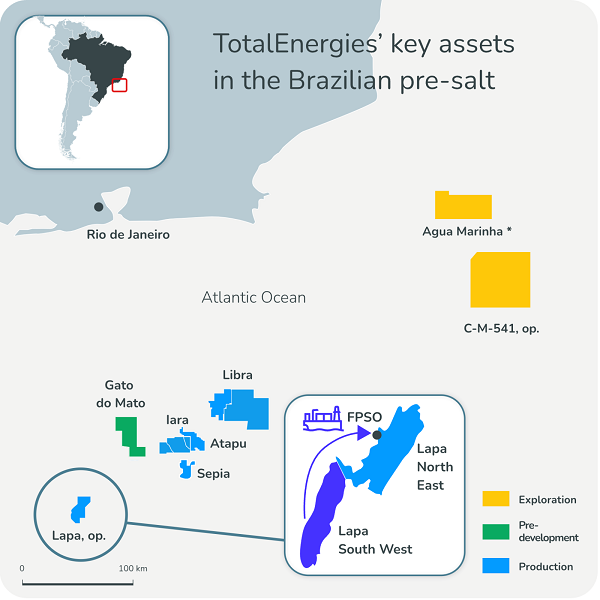
Lapa South-West
In January, TotalEnergies approved the final investment decision for the $1 billion Lapa South-West oil development offshore Brazil.
Lapa South-West in Block BM-S-9 in the Santos Basin will be developed through three wells, connected to the existing Lapa FPSO 7 miles away, which has been producing Lapa North-East since 2016. Lapa South-West is in 7,000 ft of water.
At production start-up, expected in 2025, Lapa South-West will increase production from the Lapa Field by 25,000 bbl/d, bringing the overall production to 60,000 bbl/d.
Earlier this year, TotalEnergies awarded Saipem a contract for the EPCI of subsea umbilicals, risers and flowlines, as well as a subsea production system.
Aker Solutions will deliver up to three subsea trees and control systems, a tie-in, structures and subsea umbilicals, as well as associated equipment and installation work.
TotalEnergies operates the project with a 45% interest, in partnership with Shell with 30% interest and Repsol Sinopec with 25% interest.
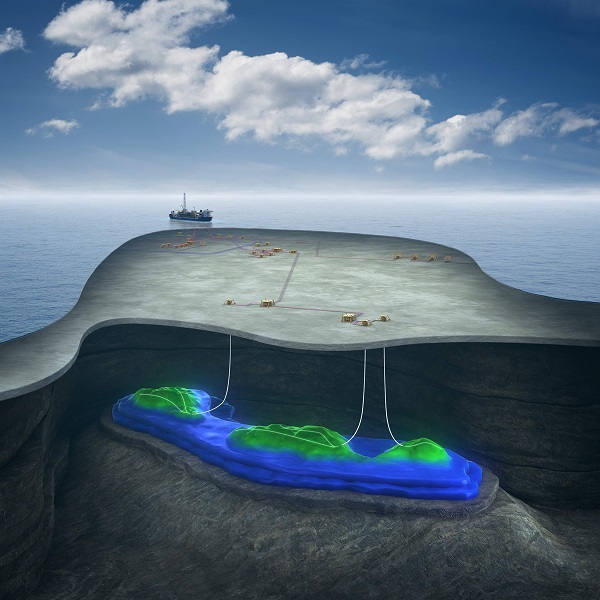
Trell & Trine
Aker BP’s $700 million Trell & Trine development will tie back to the Alvheim FPSO, about 15 miles away in the North Sea with production expected to begin in early 2025.
Trell, discovered in 2014, and Trine, discovered in 1973, are about 3 miles apart in PL102F/G and PL036E/F and will tie back to the Alvheim FPSO via the existing East Kameleon subsea manifold.
Recoverable resources in Trell & Trine are estimated at 25 MMboe, and the fields are in a water depth of 400 ft.
For this project, Aker Solutions will deliver a subsea production system including three horizontal subsea trees, two manifolds, control systems and close to 18 miles of subsea umbilicals, as well as associated equipment and installation work.
Subsea7 will handle the EPCI of the pipe-in-pipe pipelines, spools, protection covers and tie-ins.
Aker BP operates the field with a 61.26% interest and is partnered with Petoro who owns 26.84% and LOTOS Exploration & Production Norge who owns 11.9%.
Recommended Reading
Vår Selling Norne Assets to DNO
2024-05-08 - In exchange for Vår’s producing assets in the Norwegian Sea, DNO is paying $51 million and transferring to Vår its 22.6% interest in the Ringhorne East unit in the North Sea.
SLB OneSubsea JV to Kickstart North Sea Development
2024-05-07 - SLB OneSubsea, a joint venture including SLB and Subsea7, have been awarded a contract by OKEA that will develop the Bestla Project offshore Norway.
EOG: Utica Oil Can ‘Compete with the Best Plays in America’
2024-05-09 - Oil per lateral foot in the Utica is as good as top Permian wells, EOG Resources told analysts May 3 as the company is taking the play to three-mile laterals and longer.
Chevron, Total’s Anchor Up and (Almost) Running
2024-05-07 - During the Offshore Technology Conference 2024, project managers for Chevron’s Anchor Deepwater Project discussed the progress the project has made on its journey to reach first oil by mid-2024.
SM Energy Targets Prolific Dean in New Northern Midland Play
2024-05-09 - KeyBanc Capital Markets reports SM Energy’s wells “measure up well to anything being drilled in the Midland Basin by anybody today.”


